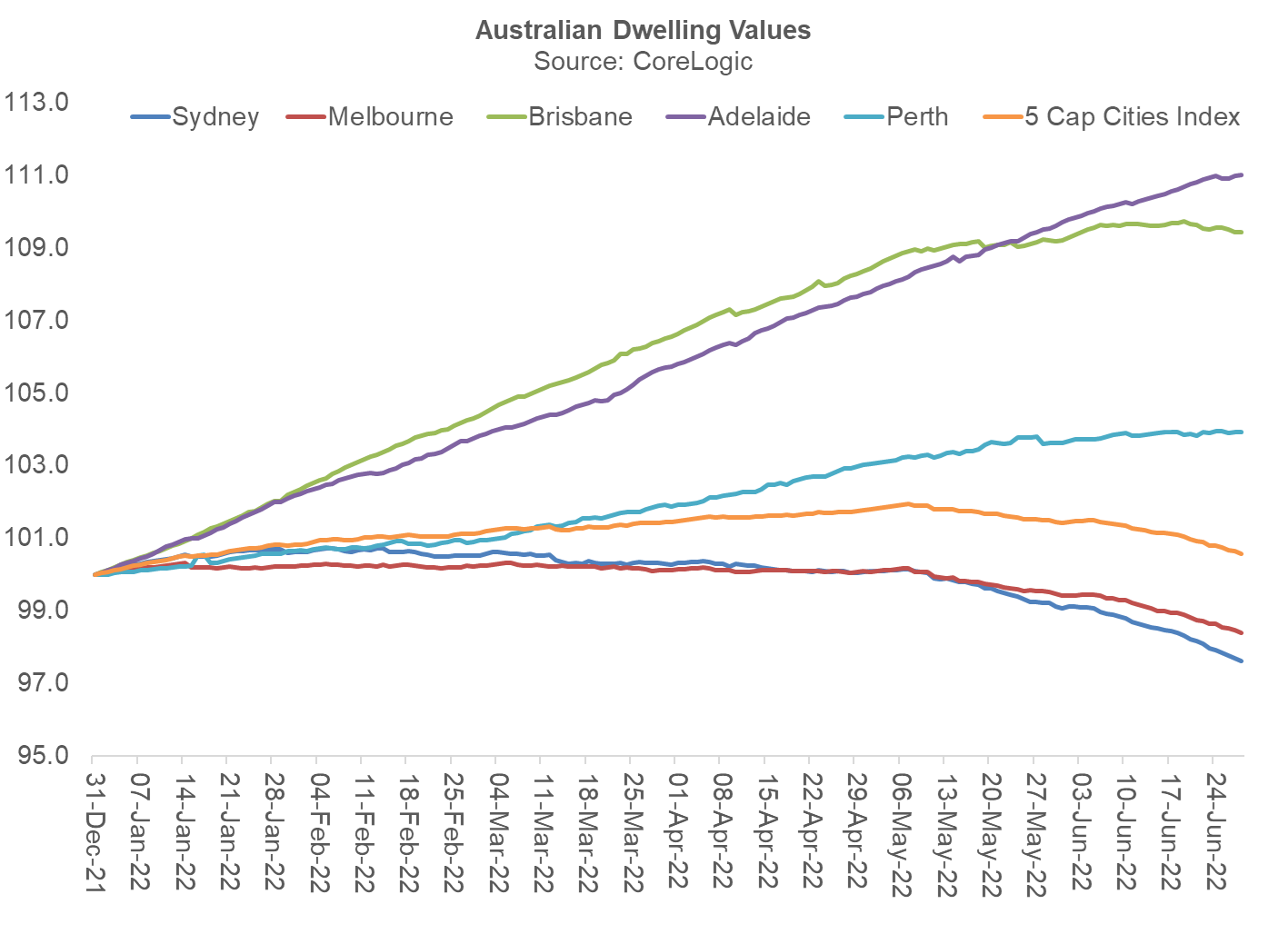Aussie house prices fall for the second month in a row - and the pace of declines is accelerating quickly
In what should come as no surprise to regular readers of this column, Australian house prices have declined for the second month in a row in June--and the pace of losses is accelerating sharply. According to CoreLogic's market-leading daily hedonic index, dwelling values across the five largest cities fell by more than 0.8% in June following on from a 0.4% loss in May.
Once again, the steepest losses were in Sydney, where dwelling values dropped by a chunky 1.5% in June (vs -1.0% in May), and Melbourne, where home values fell by 1.0% (vs -0.7% in May). House prices in Australia's two largest conurbations are therefore declining at a double-digit annualised pace. Since their peak earlier this year, Sydney dwelling values have now lost 3.1% while homes in Melbourne have declined by 1.9%. There is also clear evidence that what is destined to become the largest draw-down in Aussie housing market history is gradually extending to Brisbane, where home values look to be rolling over (see below), and Perth, where prices are moving side-ways once again. Pity the poor home buyers who went out and borrowed vast sums on the basis of the RBA's guidance that they would not lift interest rates until 2024 at the earliest.

Sharp house price declines are a very important signal for the RBA, which has stated that it will be watching housing conditions--and their impact on household spending--like a hawk. The housing market is, after all, the purest exemplification of the monetary policy transmission mechanism in practice. The RBA also looks to have backed away somewhat from its fixation with a 2.5% "neutral" cash rate point estimate, which was being bandied around willy-nilly as some sort of reasonable target. In his most recent speech, the RBA's governor, Phil Lowe, commented:
I want to emphasise though that we are not on a pre-set path [to a specific interest rate end point]. How fast we increase interest rates, and how far we need to go, will be guided by the incoming data and the Board's assessment of the outlook for inflation and the labour market. As we make that assessment each month, the Board will be paying close attention to developments in the global economy, the evolution of labour costs and how household spending is responding to higher interest rates.
In October 2021 Coolabah forecast that national house prices would fall by a record 15-25% after the RBA's first 100 basis points worth of rate hikes (see here and here). We expected those hikes to start in mid-2022 at the earliest. As it turned out, the RBA initiated the first hike in May 2022. Peak-to-trough housing cycles in Australia typically take 1-2 years, although much depends on whether the RBA starts cutting rates after it completes its monetary policy tightening process.
For over a decade we have warned investors to expect much more volatile Australian housing cycles as a result of the huge increase in household debt and the regime change in the interest rate elasticity of savings and spending decisions.
There have been some surprising claims that Coolabah's housing forecasts are outlandish even though they are fully supported by the RBA's own model of the housing market, which actually points to even larger price declines, and has been belatedly embraced by most bank economists.
Perhaps the craziest response to our forecasts has been the suggestion that Australians should expect house prices to rise, not fall, in response to interest rate increases. Setting aside the fact that this proposition has no logical basis, it is empirically eviscerated by case studies of rate hikes triggering house price falls in 2007-2008, 2010-2012, and 2017-2019. In 2017-2019 house prices dropped by 10-11% after APRA imposed macroprudential constraints that forced banks to materially lift their investment property loan rates.
We also know that interest rate cuts in 2008-2009, 2011-2016, 2019-2020, and 2020 all precipitated substantial appreciation in national dwelling values. It should be simple for even a child to understand the idea that as the cost of buying a home rises and falls, the value of the asset will adjust accordingly. The same principle also applies to equities: as the interest rate one applies to value the stream of cash-flows attributable to any company increases or decreases, the value of the shares in that company will also rise or fall.
This is indeed precisely why Coolabah forecast a 30-60% decline in US equities in December last year (see here, here, here, here, and here)--because we projected that 10-year bond yields in the US would increase from their 1.3% level at the time to north of 3.2%. It is also why we were extremely bearish on our own asset classes (specifically duration and credit), and other sectors, such as crypto...
Access Coolabah's intellectual edge
With the biggest team in investment-grade Australian fixed-income and over $7 billion in FUM, Coolabah Capital Investments publishes unique insights and research on markets and macroeconomics from around the world overlaid leveraging its 14 analysts and 5 portfolio managers.
2 topics

